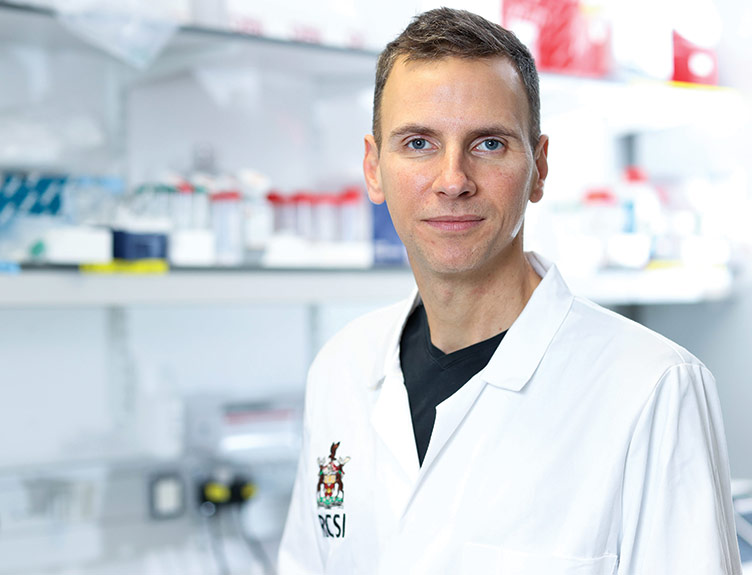Discovery of corrector drugs is key to treatment of cystic fibrosis

Discovery of new corrector drugs that target the genetic mutation which is the underlying cause of cystic fibrosis (CF), rather than the symptoms, is key to developing effective treatments for the condition, an expert in CF drug discovery has said.
Research into these targeted treatments is the topic of a keynote address by Professor Luis Galietta, Professor in Molecular Genetics at the University of Genova, who will deliver the John J Ryan Distinguished Lecture at RCSI Research Day 2015, which is taking place at the Royal College of Surgeons in Ireland (RCSI) today.
CF is caused by mutations that abolish the function of CFTR, a protein that is needed to transport chloride and bicarbonate across cell membranes. CF mutations have been grouped in classes according to the mechanism through which they affect this protein. 10% of all CF patients with class 3 mutations can benefit from a recently approved drug, Kalydeco, which has shown to be highly effective. However, the majority of CF patients (70-90%) have different mutation (F508del) and require a different type of pharmacological treatment.
In his talk entitled 'Pharmacological correction of the cystic fibrosis basic defect: problems and opportunities', Professor Luis Galietta will describe how present scientific research efforts are directed towards the identification of drugs, known as correctors, which can lessen the effects of F508del mutation. Professor Galietta and his team are among those who have been researching effective correctors by various strategies, including screenings on cultured cells of large collections of chemical compounds looking for molecules that improve the stability and function of mutant CFTR protein.
RCSI's annual Research Day provides scientists with the opportunity to showcase their most recent research findings. The latest advances in biomedical sciences, clinical research, population health sciences, healthcare delivery and health professions education are just some of the topics featured in studies which will be presented today to more than 300 researchers who are expected to attend.
The emphasis for RCSI Research Day is on research presentations by investigators early in their career, post-doctoral fellows, post-graduate and undergraduate scholars and academic staff. All oral presentations and poster presentations will be judged and awards will be presented at a ceremony later this evening.
New tissue regeneration
In other news, researchers from the Tissue Engineering Research Group (TERG), RCSI Department of Anatomy have also developed a unique therapeutic platform that potentially can be used to block harmful genes and enhance beneficial ones and thus has potential to repair damaged or diseased organs for a myriad of conditions, it was reported today at the RCSI Research Day 2015.
The discovery will potentially lead to new treatment for diseases that would benefit from tissue repair, including repair of cartilage in osteoarthritis and vascular tissue in diabetes. In addition to enhancing tissue repair by ‘switching on' beneficial genes, the therapeutic platform has the ability to ‘switch off' genes that cause disease, such as genes that cause excessive bone growth in osteoarthritis, which is a major new finding that has emerged from the study.
The system allows for the local delivery of both activators and inhibitors of micro-ribonucleic acids (microRNAs), an RNA interference technology alternative to gene therapy, in combination with nanoparticles and a collagen-based scaffold biomaterial, designed specifically for tissue repair. In this study, the team developed a highly efficient microRNA delivery approach by implementing their own in-house scaffold-based transfection system, which involved the combination of a collagen-based scaffold previously developed for tissue repair and optimised nano-hydroxyapatite particles, previously developed for plasmid DNA gene delivery, as safe and effective non-viral microRNA delivery vectors for human stem cells.
The research was the result of a multi-disciplinary effort between cell biologists, clinicians and engineers in the TERG, which is part of the Advanced Materials and Bioengineering Research (AMBER) Centre, and was led by Prof. Fergal O'Brien and Dr Garry Duffy in RCSI. Results of this study have just been published in the leading specialist journal in the field, Journal of Controlled Release, with Irene Mencía Castaño, a PhD student in the TERG supervised by Prof O'Brien, Dr Duffy and Dr Caroline Curtin, as first author.



